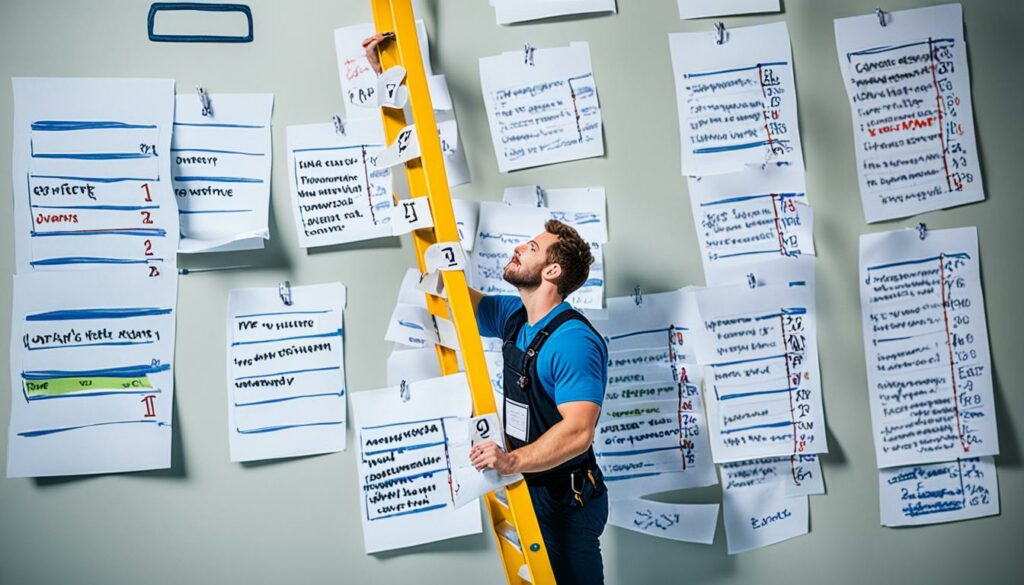Do you ever feel overwhelmed by the demands of your daily life? The never-ending to-do list, the mounting deadlines, and the constant pressure to do more? Trust me, I’ve been there. I know what it’s like to juggle multiple responsibilities and feel like there just aren’t enough hours in the day. But here’s the thing – there are small changes you can make to your routine that can have a big impact on your productivity, resilience, and overall well-being.
Imagine starting each day with a sense of calm and confidence, knowing that you have a plan in place to tackle your tasks efficiently. Picture yourself staying focused and motivated throughout the day, effortlessly navigating through your workload and managing any unexpected challenges that come your way. With the right productivity hacks, you can make this your reality.
In this article, we will explore practical strategies to boost your productivity, enhance your mental toughness, and effectively manage stress. From planning your day to creating a dedicated workspace, from setting goals to practicing self-care, you will discover actionable tips that can transform the way you approach your work and life. Are you ready to unlock your full potential? Let’s dive in!
Key Takeaways:
- By incorporating productivity hacks into your routine, you can enhance your efficiency and mental resilience.
- Planning your day and setting goals can help you stay organized and focused.
- Optimizing your work environment and taking regular breaks are crucial for maintaining productivity.
- Learning to say no and practicing self-care contribute to overall well-being.
- Embracing imperfection and focusing on progress can help you overcome perfectionism and achieve your goals.
Plan Your Day for Maximum Productivity
To maximize your productivity, start by planning your day ahead of time. Create a detailed schedule, including the tasks you need to accomplish and the specific time allocated for each task. This will help you stay organized, avoid guesswork, and ensure that you focus on important tasks.
Having a clear plan in place allows you to prioritize your tasks effectively and allocate your time wisely. By mapping out your day, you can identify any potential gaps or overlaps in your schedule and make necessary adjustments.
A well-structured plan not only provides a roadmap for your day but also helps in managing your energy levels and avoiding burnout. By scheduling breaks and leisure activities, you can maintain a healthy work-life balance and enhance your overall well-being.
“By failing to prepare, you are preparing to fail.” – Benjamin Franklin
When creating your daily plan, it’s important to consider your unique work style and preferences. Some individuals prefer to tackle challenging tasks in the morning, while others may thrive in the afternoon or evening. Identify your most productive hours and align your schedule accordingly, ensuring that you optimize your performance during those times.
Moreover, keep in mind that unexpected events or time-consuming tasks may arise throughout the day. To avoid feeling overwhelmed or derailed from your plan, leave some flexibility in your schedule. This way, you can adapt to changes while still staying focused on your key priorities.
The Power of Task Prioritization
Task prioritization is an essential aspect of effective planning. By ranking your tasks based on importance and urgency, you can ensure that you dedicate your time and energy to the most crucial activities.
One helpful technique for task prioritization is the Eisenhower Matrix. This matrix categorizes tasks into four quadrants:
- Urgent and important: These tasks are vital and require immediate attention. They should be given the highest priority.
- Important but not urgent: These tasks contribute to your long-term goals and should be scheduled accordingly. Set aside dedicated time to focus on them.
- Urgent but not important: These tasks may demand your immediate attention but do not align with your long-term goals. Whenever possible, delegate or minimize the time spent on these tasks.
- Not urgent and not important: These tasks are low-priority and do not significantly impact your goals. Avoid spending excessive time on them.
“The key is not to prioritize what’s on your schedule but to schedule your priorities.” – Stephen Covey
By utilizing the Eisenhower Matrix, you can focus your efforts on what truly matters and avoid getting swept up in less important tasks. This method ensures that you allocate your time and resources efficiently, enhancing your overall productivity.
Remember, effective planning and task prioritization are key components of successful time management. By dedicating time to plan your day and rank your tasks accordingly, you can boost your productivity, achieve your goals, and maintain a healthy work-life balance.
Set Goals and Prioritize Tasks
When it comes to boosting your productivity, setting goals and prioritizing tasks are essential techniques to master. By identifying your most important tasks and focusing on them, you can ensure that you make progress towards your objectives and achieve meaningful results. Here’s how you can effectively set goals and prioritize tasks to enhance your productivity:
1. Write Down Your Three Most Important Tasks
Start by identifying the top three tasks that you need to accomplish for the day. Writing them down helps clarify your priorities and keeps you focused on what truly matters. Remember, it’s better to focus on a few important tasks rather than trying to tackle numerous tasks at once.
2. Prioritize Important Over Urgent Tasks
While it’s tempting to tackle urgent tasks first, it’s crucial to prioritize important tasks instead. Important tasks are those that align with your goals and have a significant impact on your progress. By prioritizing them, you ensure that you’re spending your time and energy on the tasks that will yield the greatest results.
3. Utilize Productivity Techniques
To further enhance your task prioritization, consider using productivity techniques such as the Eisenhower Matrix. This matrix categorizes tasks based on their importance and urgency, making it easier to identify which tasks should be addressed immediately, delegated, scheduled, or eliminated.
The key to effective task prioritization is understanding that not all tasks are created equal. By differentiating between important and urgent tasks and leveraging productivity techniques like the Eisenhower Matrix, you can ensure that your time and effort are focused on what truly matters.
By setting goals and prioritizing tasks, you can work more efficiently, make progress towards your objectives, and accomplish more in your day. Remember to regularly review and adjust your goals and priorities, allowing for flexibility and adaptability to changing circumstances.

| Benefits of Goal Setting and Task Prioritization | Techniques |
|---|---|
| Increased focus and clarity | Eisenhower Matrix |
| Improved time management | SMART goals |
| Enhanced productivity | Priority-based task lists |
| Greater sense of accomplishment | Time blocking |
Optimize Your Work Environment
Create a dedicated workspace that is free from distractions and clutter. A well-organized and optimized workspace can significantly impact your productivity and focus.
When setting up your workspace, consider the following:
- Workspace Setup: Choose a location that is quiet and separate from other areas of your home. Designate a specific area solely for work-related activities.
- Natural Light: Arrange your workspace near a window or a source of natural light. Natural light can improve your mood, increase alertness, and enhance productivity.
- Dedicated Workspace: Create a dedicated workspace that is solely used for work. This helps to psychologically separate your work life from your personal life, allowing you to maintain focus and boundaries.
- Distractions: Eliminate possible distractions in your workspace, such as loud noises, clutter, or personal devices that may divert your attention. Consider using noise-canceling headphones or background noise apps to minimize interruptions.
- Website Blockers: If you find yourself getting easily distracted by social media or other websites, consider using website blockers or browser extensions to temporarily restrict access to non-work-related sites during work hours.
A well-optimized workspace can help create a conducive environment for maximum productivity and focus. By eliminating distractions, incorporating natural light, and organizing your workspace, you can enhance your work efficiency and overall well-being.
Take a look at the image below for inspiration on how to optimize your workspace:
Work in Short Bursts and Take Breaks
Maintaining focus and preventing burnout is essential for optimal productivity. One effective method is to work in short bursts using the Pomodoro technique. This technique involves dividing your work into intervals, typically 25 minutes of focused work followed by a 5-minute break. This structured approach allows you to maintain concentration and productivity by working within manageable time frames.
During each work interval, dedicate your undivided attention to the task at hand. Avoid multitasking or getting distracted by unrelated activities, such as checking emails or social media. By focusing exclusively on one task, you’ll be able to complete it efficiently and effectively.
Once the 25-minute work interval is over, take a 5-minute break to rest and recharge your mind. Use this time to stretch, grab a quick snack, or simply relax. These regular breaks throughout the day can rejuvenate your energy levels and prevent mental fatigue.
The Pomodoro technique is highly customizable based on individual preferences and needs. Some people prefer shorter work intervals and longer breaks, such as 15-minute work intervals with 10-minute breaks. Experimentation can help you find the work-to-break ratio that suits you best.
| Benefits of the Pomodoro Technique | Drawbacks of the Pomodoro Technique |
|---|---|
|
|
Say No and Set Boundaries
One of the key aspects of effective time management and productivity is learning to say no and setting boundaries. It can be tempting to take on every request or task that comes your way, but overcommitting yourself can lead to burnout and decreased productivity. By setting boundaries and prioritizing your time, you can stay focused on what truly matters and avoid spreading yourself too thin.
When someone asks you to take on an additional task or project, consider whether it aligns with your priorities and workload. If it doesn’t, don’t be afraid to say no. Saying no doesn’t mean you’re being selfish or unhelpful—it’s about protecting your time and energy for the tasks that are most important to you.
Remember, every time you say yes to something, you’re saying no to something else. By saying no to tasks that don’t align with your goals, you’re saying yes to your own productivity and well-being.
Setting boundaries also involves managing the expectations of others. If you consistently respond to emails or work messages outside of your designated working hours, people may come to expect immediate responses from you at all times. To avoid this, establish clear boundaries around when you are available and set realistic expectations with others.
| Benefits of Setting Boundaries | How to Set Boundaries |
|---|---|
|
|
By setting boundaries and learning to say no when necessary, you can create a more balanced and productive work-life dynamic. Remember, your time and energy are valuable resources, and it’s important to use them wisely.
Practice Self-Care and Well-Being
Amidst the demands and pressures of everyday life, it’s essential to prioritize self-care and well-being. Taking care of your mental and emotional health is not only important for your overall well-being but also crucial for maintaining productivity and managing stress effectively.
Schedule dedicated time for self-care activities to recharge and prevent burnout. Engaging in activities that help you relax and unwind is key. Consider incorporating the following practices into your routine:
- Reading: Get lost in a good book that transports you to different worlds, ignites your imagination, and provides a much-needed escape from daily responsibilities.
- Meditation: Take a few moments each day to sit in stillness and quiet your mind. Practice mindful breathing and let go of stress and tension.
- Exercise: Engage in physical activities that you enjoy, such as jogging, yoga, or dancing. Exercise releases endorphins, boosts your mood, and helps you stay fit and energized.
Remember, self-care is not selfish but rather an essential part of maintaining a healthy work-life balance and nurturing your mental well-being. Prioritize yourself and make self-care a non-negotiable part of your daily routine.

“Self-care is not about self-indulgence, but about self-preservation.”
Embrace Imperfection and Focus on Progress
Striving for perfection can be a roadblock to productivity. Instead of fixating on flawlessness, prioritize completing tasks and making progress towards your goals. Perfectionism often leads to unnecessary delays and a constant dissatisfaction with your work. By embracing the concept of “good enough,” you can free yourself from the burden of perfection and adopt a more productive mindset.
When working on a task, ask yourself, “What is necessary for completion?” Instead of getting caught up in every minute detail, focus on fulfilling the essential requirements and meeting the desired outcome. Remember that achieving progress is more important than achieving perfection.
“Striving for excellence motivates you. Striving for perfection is demoralizing.” – Harriet Braiker
Perfectionism can hold you back from exploring new opportunities and taking risks. It can prevent you from starting projects because of the fear of not being able to attain perfection. By embracing imperfection, you allow room for growth, learning, and experimentation.
Shift Your Perspective
Instead of viewing mistakes as failures, see them as valuable learning experiences. Every setback is an opportunity to analyze and improve. Recognize that progress often involves trial and error, and mistakes are stepping stones towards success.
Adopting a productivity mindset that focuses on progress allows you to celebrate achievements, no matter how small they may seem. Each completed task brings you closer to your goals, boosting your confidence and fueling your motivation to keep moving forward.
Stay Motivated and Keep Moving
When facing challenging tasks, break them down into smaller, manageable steps. This approach not only makes the task less overwhelming but also allows you to track your progress more effectively. Celebrate each milestone reached, and use it as a source of motivation to keep going.
Acknowledge that perfection is an elusive and subjective concept. What may be perfect to one person might not be the same for another. Therefore, striving for perfection can be an endless pursuit that hinders your productivity. Instead, focus on completing your tasks to the best of your abilities and making continuous progress.
Remember, imperfection is a part of being human. Embracing imperfection allows you to manage your time, energy, and resources more effectively. By letting go of the need for perfection, you can unleash your creativity, increase your productivity, and achieve greater satisfaction in your work.
Conclusion
Incorporating resilience training, productivity hacks, and stress management techniques into your daily routine can have a profound impact on your overall well-being and productivity. By following practical strategies such as planning your day, setting goals, and optimizing your work environment, you can enhance your mental toughness and effectively manage stress.
Remember to embrace imperfection and focus on progress rather than striving for perfection. This mindset shift will help you stay motivated and avoid unnecessary delays. Additionally, prioritize self-care activities and schedule time for relaxation to recharge your mind and prevent burnout.
By implementing these productivity hacks and adopting a productivity mindset, you can achieve your goals, enhance your mental resilience, and lead a more productive and fulfilling life. So start incorporating these strategies today and watch your productivity soar!
